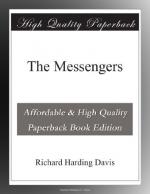The day she sailed away he went to the steamer, and, separating her from her friends and family, drew her to the side of the ship farther from the wharf, and which for the moment, was deserted. Directly below a pile-driver, with rattling of chains and shrieks from her donkey-engine, was smashing great logs; on the deck above, the ship’s band was braying forth fictitious gayety, and from every side they were assailed by the raucous whistles of ferry-boats. The surroundings were not conducive to sentiment, but for the first time Polly Kirkland seemed a little uncertain, a little frightened; almost on the verge of tears, almost persuaded to surrender. For the first time she laid her hand on Ainsley’s arm, and the shock sent the blood to his heart and held him breathless. When the girl looked at him there was something in her eyes that neither he nor any other man had ever seen there.
“The last thing I tell you,” she said, “the thing I want you to remember, is this, that, though I do not care—I want to care.”
Ainsley caught at her hand and, to the delight of the crew of a passing tug-boat, kissed it rapturously. His face was radiant. The fact of parting from her had caused him real suffering, had marked his face with hard lines. Now, hope and happiness smoothed them away and his eyes shone with his love for her. He was trembling, laughing, jubilant.
“And if you should!” he begged. “How soon will I know? You will cable,” he commanded. “You will cable ‘Come,’ and the same hour I’ll start toward you. I’ll go home now,” he cried, “and pack!”
The girl drew away. Already she regretted the admission she had made. In fairness and in kindness to him she tried to regain the position she had abandoned.
“But a change like that,” she pleaded, “might not come for years, may never come!” To recover herself, to make the words she had uttered seem less serious, she spoke quickly and lightly.
“And how could I cable such a thing!” she protested. “It would be far too sacred, too precious. You should be able to feel that the change has come.”
“I suppose I should,” assented Ainsley, doubtfully; “but it’s a long way across two oceans. It would be safer if you’d promise to use the cable. Just one word: ‘Come.’”
The girl shook her head and frowned.
“If you can’t feel that the woman you love loves you, even across the world, you cannot love her very deeply.”
“I don’t have to answer that!” said Ainsley.
“I will send you a sign,” continued the girl, hastily; “a secret wireless message. It shall be a test. If you love me you will read it at once. You will know the instant you see it that it comes from me. No one else will be able to read it; but if you love me, you will know that I love you.”
Whether she spoke in metaphor or in fact, whether she was “playing for time,” or whether in her heart she already intended to soon reward him with a message of glad tidings, Ainsley could not decide. And even as he begged her to enlighten him the last whistle blew, and a determined officer ordered him to the ship’s side.




